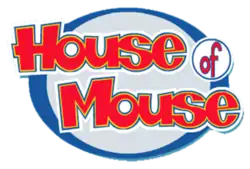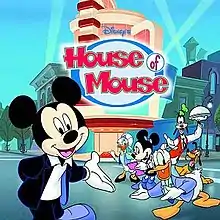House of Mouse
Disney's House of Mouse (or simply House of Mouse) is an American animated television series produced by Walt Disney Television Animation that originally aired for three seasons from January 13, 2001, to its finale on October 24, 2003.[1] The show focuses on Mickey Mouse and his friends running a cartoon theater dinner club in the fictional ToonTown, catering to many characters from Disney cartoons and animated movies while showcasing a variety of their cartoon shorts.[2] 52 episodes were produced.[3] The series is named after a common nickname or epithet for the Walt Disney Company.
| House of Mouse | |
|---|---|
 | |
| Created by |
|
| Based on | Characters by Walt Disney Animation Studios |
| Directed by |
|
| Presented by | Wayne Allwine |
| Voices of | |
| Narrated by | Rod Roddy |
| Theme music composer | Brian Setzer |
| Composers | Michael Tavera Stephen James Taylor (Mickey Mouse Works cartoons) |
| Country of origin | United States |
| No. of seasons | 3 |
| No. of episodes | 52 (list of episodes) |
| Production | |
| Running time | 20 minutes (Shorts 10 minutes approx.) |
| Production company | Walt Disney Television Animation |
| Distributor | Buena Vista Television |
| Release | |
| Original network |
|
| Picture format | |
| Audio format | Stereo |
| Original release | January 13, 2001 – October 24, 2003 |
| Chronology | |
| Related shows | Mickey Mouse Works |
| External links | |
| Website | |
The animated series is a spin off of the popular short-lived Disney series Mickey Mouse Works, and featured many Mouse Works shorts as well as selection of brand new shorts; classic Mickey Mouse, Goofy and Donald Duck shorts from the 1930s–50s were also occasionally seen, particularly towards the end of the series' run when the finite backlog of Mouse Works shorts had almost been exhausted.
During its time, the animated series held two nominations for awards, while select cast members won two awards for their performances as characters in House of Mouse. The series featured two special films – Mickey's Magical Christmas: Snowed in at the House of Mouse and Mickey's House of Villains – along with an all-night marathon of the House of Mouse, aired on Toon Disney in September 2002 under the title "Night of 1,000 Toons".
Premise

The basic premise of the show focuses on Mickey Mouse and his friends operating a dinner theater club in downtown ToonTown. Considered a popular venue by the residents, the club is frequented by a host of character from Disney animated properties – every character from cartoons and films produced by Walt Disney Animation Studios are featured in the episodes, with the exception of those made after 2001–2003 (such as Lilo & Stitch) and Dinosaur due to being CGI. Such characters mostly appear as paying guests of the club, with a few voiced in episodes depending on the scripts provided to voice actors, although a number sometimes operate as performers for the club. The animated series is more notable for including many relatively obscure and otherwise rarely used Disney characters, often with speaking parts for the very first time - for example, Li'l Bad Wolf and April, May and June, who had appeared very often in Disney comic books but never before in an animated cartoon, finally made their animated debuts on House of Mouse. The show also featured some cameos by characters created for other television cartoons and theme park attractions, but these appearances were few and far between.
Each episode focuses on a story involving Mickey and his associates facing an issue during an evening's operation of the club, and their efforts to overcome it – the most common plot for episodes involves the group dealing with a serious problem caused by Pete in his attempts to shut down the club and use it for his own gains. These stories, often involving farcical mishaps, tended to act as a wraparound for the cartoon shorts played in between scenes, the theme of the story contributing towards the story-lines of the cartoon shorts shown in the episode.[4] Cartoon shorts played in episodes focused on elements from classic theatrical cartoons of the 1930s, 1940s and 1950s, though most were reruns from Mickey Mouse Works, and featured a simple story. Some stories were set to a specific theme for a specific character, but with differing scenarios – for example, one set focused on Mickey seeking to rescue Minnie from Pete, against a different obstacle in each short, while another set focused on Pluto's efforts to get Mickey his paper while facing a different problem.
Characters
- Mickey Mouse (voiced by Wayne Allwine): Mickey operates the club as general manager and co-owner, but leaves the club's management to his friends. His main role in the club is hosting the evening's entertainment as its showbiz superstar.
- Minnie Mouse (voiced by Russi Taylor): Minnie operates as the club's show planner and bookkeeper, and is responsible for the club's day-to-day administration. Her performance at keeping the club running well makes her a pillar of support in times of crisis, especially in keeping Mickey calm when he panics over a situation.
- Donald Duck (voiced by Tony Anselmo): Donald operates as the club's deputy manager, responsible for the overall customer service at the club and tending to the needs of VIP guests. Although a co-owner in the club, he is envious of Mickey's fame and position and tends to want to run the club himself, though his efforts are usually thwarted by his conscience preventing him betraying his friendship with Mickey.
- Daisy Duck (voiced by Tress MacNeille): Daisy operates as the reservation clerk for the club, but often dreams of being a star in her own right, which often sees her attempting to try out a new act in the club that often backfires.
- Goofy (voiced by Bill Farmer): Goofy operates as the head waiter, managing the club's restaurant operations with his usual accident-prone yet genial manner of work. Despite this difficulty, Goofy manages to ensure guests receive their meals without issues.
- Pluto (voiced by Bill Farmer): Pluto operates as both the club's mascot, and as a personal assistant to both Mickey and Minnie.
- Horace Horsecollar (voiced by Bill Farmer): Horace operates as the club's technical engineer, in charge of the lighting, loudspeakers, and video players. A recurring gag in the animated series is his habit of literally doing as told and hitting his equipment to get them working, and a tendency to state about what is wrong in general life, rather than specifically on something that just happened when asked.
- Clarabelle Cow (voiced by April Winchell): Clarabelle operates as the club's gossip monger with her own show, collecting and spreading rumours about characters all over ToonTown, although her gossip tends to occasionally cause problems as a result.
- Max Goof (voiced by Jason Marsden): Max operates as the club's valet parking attendant. He tends to enjoy his work, though a number of episodes feature stories about him debating over things he witnesses or wishes to enjoy.
- Huey, Dewey, and Louie (voiced by Tony Anselmo): Huey, Dewey and Louie operate as the club's house band. Throughout the course of the animated series' run, the trio operated under different names and genres of music, parodying noted music bands of the time - "The Quackstreet Boys", "Quackwerk", "Kid Duck" and "The Splashing Pumpkins".
- Gus Goose (voiced by Frank Welker): Gus operates as the club's chef, but his notorious gluttony tends to cause him to eat the food he prepares for guests before it is served.
- Magic Mirror (voiced by Tony Jay): Magic Mirror acts as the club's on-site consultant, often providing advice when asked by Mickey and his friends, as well as answering queries about the club's guests.
- Mike (voiced by Rod Roddy): Mike is a talking microphone, who operates as the club's announcer. The character is mainly involved at the beginning and end of the episodes, the latter often involving him providing a fictional advert connected to one of Disney's characters, cartoons, or animated films.
- Penguin waiters: The penguin waiters from Mary Poppins operate as the waiting staff of the club, assisting Goofy.
- Animated brooms: The brooms from Fantasia's The Sorcerer's Apprentice operate as the janitors of the club, mainly keeping it clean.
- Pete (voiced by Jim Cummings): Pete is show's main antagonist and the club's shady landlord. Episodes featuring him tend to involve him seeking a way to shut down the club - per a contract he made with Mickey at the start of the animated series to own the House of Mouse, the club can only be shut down if there is no show going on. His efforts to do so always backfire.
Production
The show was produced by Walt Disney Television, and originally aired from 2001 to 2003, running for 52 episodes. The show is one of many Disney cartoon series made in the widescreen HD format. Like with Mickey Mouse Works, the animation was outsourced to Toon City in the Philippines. Unlike that series, it was also outsourced to Walt Disney Animation Australia and Walt Disney Animation Japan.
House of Mouse aired on One Saturday Morning on ABC. It reran from September 3, 2002 to February 4, 2006 on Disney Channel. The show ceased broadcast on U.S. television on February 6, 2009, after being aired for the last time on Toon Disney before becoming Disney XD.
The theme song is performed by Brian Setzer.
Episodes
Awards and nominations
| Year | Nominee / work | Award | Result |
|---|---|---|---|
| 2001 | House of Mouse | Annie Award for Outstanding Achievement in a Daytime Animated Television Production | Nominated |
| 2002 | Chris Roszak (background artist) at American Broadcasting Company (ABC) | Daytime Emmy Award for Outstanding Individual in Animation | Won |
| 2002 | Jason Oliver (music editor) and Liz Lachman (scoring editor) for episodes "Pit Crew" and "Golf Nut Donald". | Motion Picture Sound Editors Golden Reel Award for Best Sound Editing in Television - Music, Episodic Animation | Nominated |
| 2003 | Corey Burton as the voice of "Ludwig Von Drake". | Annie Award for Outstanding Voice Acting in an Animated Television Production | Won |
References
- Perlmutter, David (2018). The Encyclopedia of American Animated Television Shows. Rowman & Littlefield. p. 291. ISBN 978-1538103739.
- Erickson, Hal (2005). Television Cartoon Shows: An Illustrated Encyclopedia, 1949 Through 2003 (2nd ed.). McFarland & Co. pp. 261–262. ISBN 978-1476665993.
- Crump, William D. (2019). Happy Holidays—Animated! A Worldwide Encyclopedia of Christmas, Hanukkah, Kwanzaa and New Year's Cartoons on Television and Film. McFarland & Co. p. 141. ISBN 9781476672939.
- Ken Tucker (January 26, 2001). "Bob The Builder; Disney's House Of Mouse; Jackie Chan Adventures; Static Shock; X-Men: Evolution". Entertainment Weekly. Retrieved February 11, 2019.